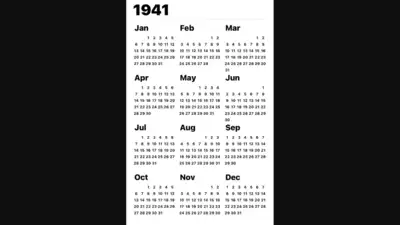ARTICLE AD BOX

(Image: https://www.reddit.com/r/decadeology)
If you’ve been scrolling through TikTok or Twitter lately, chances are you’ve come across a weirdly specific claim: that 2025 is going to be just like 1941. The reason? Apparently, the calendars are identical—same weekdays, same dates, all year long.
It sounds spooky. Like, is history about to repeat itself?Well, let's discuss.
Yes, the calendars do match—that’s true
The internet got one thing right: the 2025 calendar does match 1941’s exactly. January 1, 2025, falls on a Wednesday—just like January 1, 1941—and every date after that lines up the same way. It’s a neat quirk of the Gregorian calendar, and it happens more often than you’d think. For number nerds, this is pretty fun trivia. But for people watching world events with anxiety, it can feel like a cosmic warning.Spoiler alert: it’s not.
1941 was definitely a heavy year
Let’s not sugarcoat it—1941 was rough. On December 7, the attack on Pearl Harbor pulled the U.S. into World War II. Europe was already deep into the conflict, and the world was teetering on the edge of chaos. So yeah, 1941 changed the global game.When people see the calendar matching up, they wonder if 2025 could bring that same kind of global upheaval. But here’s the catch: history doesn’t repeat itself just because the days of the week do.
Why this idea took off online
Reddit, especially on threads like r/decadeology, has been buzzing with this calendar match-up. Users are fascinated, tossing around thoughts like, “Both years shifted the world completely.” There’s this mix of amazement, nervousness, and what-if energy. That’s totally normal—it’s human nature to look for patterns, especially when the world already feels uncertain.
But just because it feels meaningful doesn’t mean it actually is.
Let’s be real: It’s just a coincidence
Seriously, the fact that 2025 and 1941 share a calendar is just a fluke of how our timekeeping system works. It’s no different than two roads crossing at the same intersection—it doesn’t mean the same things will happen on both.The disasters of 1941 happened because of political tension, expansionist policies, broken diplomacy, and rising authoritarianism. Not because the calendar lined up a certain way. Drawing big conclusions from a date pattern? That’s not smart—it's just jumping to conclusions without evidence.
Why people love these predictions anyway
Psychologists say we’re kind of wired to fall for this stuff. Psychologists say our brains are practically built to latch onto big, dramatic stories—especially when the world feels chaotic. That’s why theories like “2025 is the same as 1941” catch fire online. It gives people a simple, powerful narrative to hold on to. Think about it: times are weird, headlines are intense, and the future feels shaky. Suddenly, a calendar match from a historically awful year? Boom—instant meaning, instant connection.
Even if there’s no actual link between the dates and real-life events, the emotional payoff feels real.This isn’t a new thing either. Remember the 2012 Mayan calendar doomsday panic? The world obviously didn’t end, but people loved the drama. It’s not because we’re gullible—it’s because we’re human. When life feels uncertain, we look for patterns. Our brains want to “make sense” of things, even if it’s a stretch. So when someone on TikTok says 2025 = 1941, people share it not just for the facts (which are flimsy), but for the feeling.
It taps into our collective unease and gives it a name. That’s the viral magic. Not truth—just storytelling mixed with a little fear and a lot of curiosity.When times are stressful or confusing, we crave meaning. A calendar match becomes a symbol, even if there’s no actual cause-effect link. It’s less about logic and more about emotion—and that’s why this rumor has so much viral power.
What we should take from 1941
Instead of spiraling into fear because of a date match, maybe we should use this as a chance to reflect.
1941 taught the world tough lessons: unchecked aggression, failed diplomacy, and ignoring warning signs can lead to catastrophe.In 2025, we’re facing different (but real) global issues—climate change, artificial intelligence, rising tensions between nations. These problems won’t be solved by superstition, but by action. The calendar doesn’t decide our future—we do.
So, is 2025 doomed? Not even close
Yes, it’s kind of spooky that the days line up.
But that’s where the similarity ends. History is shaped by people, decisions, and systems—not by the layout of a wall calendar.And sure, dramatic stories grab attention (especially on social media), but that doesn’t mean they’re accurate. It’s good to be curious—but it’s even better to be informed.
Look at the facts—then look forward
The next time you see a TikTok declaring 2025 as “the next 1941,” pause and think: What exactly are they saying? Is there any real evidence? Are they feeding fear, or offering insight?A calendar is just a tool—it’s not a prophecy. What really matters is how we respond to today’s challenges, how we treat each other, and how we shape the future. If we’ve learned anything from history, it’s that we’re capable of facing tough times—and pushing through.So let’s leave the doomsday theories behind, and focus on what actually shapes history: people, purpose, and action.



.png)
.png)
.png)
















 6 hours ago
3
6 hours ago
3









 English (US) ·
English (US) ·